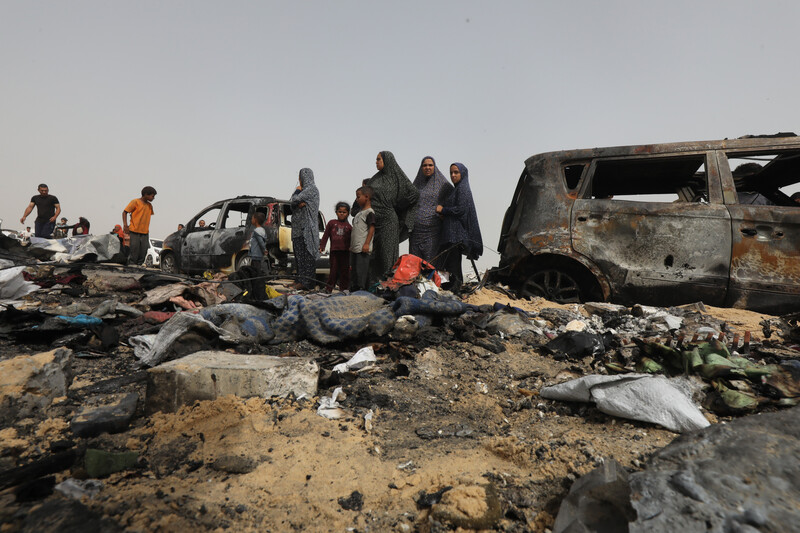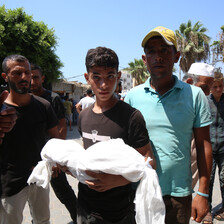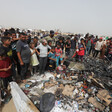The Electronic Intifada 27 May 2024

The aftermath of Sunday’s massacre in Rafah.
APA imagesAbdel-Nasr Mahmoud was trying to settle down for the night.
“At around 10 pm, we heard massive explosions,” he said. The noise “rattled” the warehouse in which his family were taking shelter.
“Suddenly, the sky turned a deep orange,” he added.
Although he immediately knew something bad had happened, Abdel-Naser was not expecting it would be so terrible. Israel was committing a massacre against people in tents.
At least 45 Palestinians were killed in the attack on the Tel al-Sultan area of Rafah, Gaza’s southernmost city. More than half of them were women and children.
Israel sought to present what was clearly an attack on displaced civilians as an operation against “legitimate targets.” The Israeli military claimed it had struck a “Hamas compound.”
According to Abdel-Nasr, civil defense workers had difficulty reaching the victims and tackling the fire which Israel’s attack caused.
“The sand turned red from the number of people wounded,” he said. “It was a scene of pure horror.”
Abdel-Nasr predicts it will take many years before he can put the scene out of his mind. He and his family are searching for alternative accommodation in Deir al-Balah, central Gaza.
“We were only a few steps from death,” he said. “We simply have to find a safe place, even though we know there’s no safe area in Gaza.”
“Will it burn us?”
Shaymaa Abu Khdair is from northern Gaza. She has been uprooted a number of times since the current war began.
Her children – aged 2 and 4 – cannot stop crying after witnessing Sunday’s Rafah massacre.
“When they saw the fire spreading, they asked me, ‘Will it burn us?’,” she said. “Our children have suffered the most in this war.”
“We’re dreaming of an end to this war every day,” she added. “We’re hoping that this genocide will stop because we’ve lost everything.”
“If it doesn’t stop, these massacres will occur again and a whole people will be wiped out,” she said. “It is truly terrifying.”
Her husband Muhammad Ziad hurried to help rescue people as soon as he heard the explosions. He was worried that some of his extended family had been killed.
It was impossible to identify the victims in the immediate wake of the massacre.
“There was a fog from gunpowder and smoke was filling the place,” Muhammad said. “I tried to pull out as many people as I could from the fire and put them in ambulances and cars.”
Some victims “at the heart of the camp” could not be assisted, he explained.
“Many people tried to fill buckets with water and help put out the fire with the civil defense,” he said. “But unfortunately we couldn’t.”
It took hours before the fire could be doused.
“Every day we survive an Israeli attack,” Muhammad said.
“We live in constant fear. We are praying for an end to these monstrous attacks.”
Abubaker Abed is a journalist and translator from Deir al-Balah refugee camp in Gaza.





